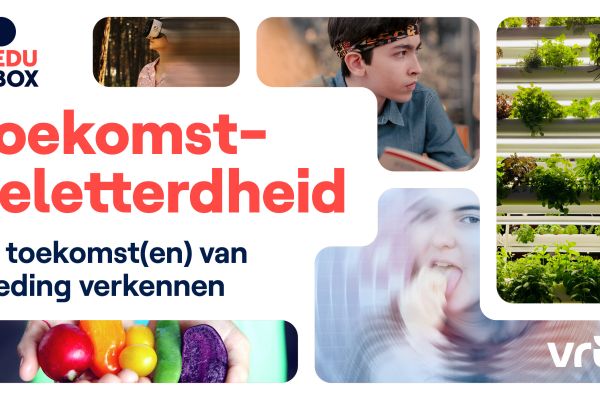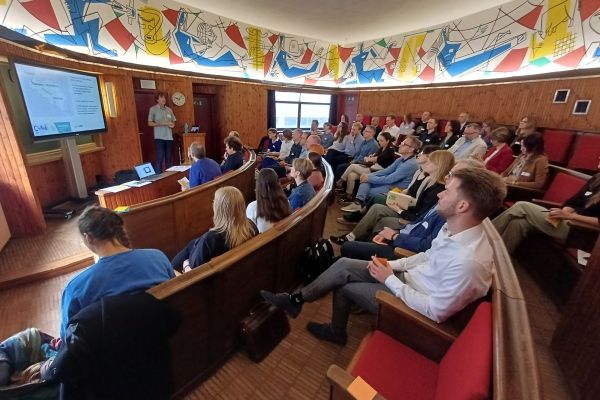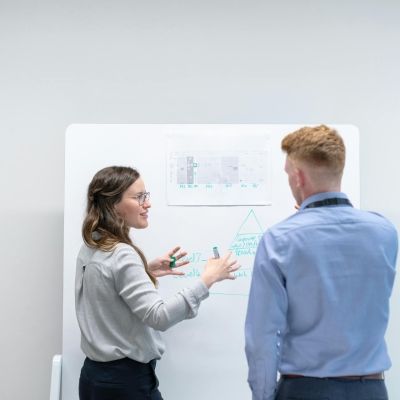A new collaboration platform for eo data and services
In a world filled with Earth observation data and innovative image processing technology, we are privileged to access and offer EO-based services which can support many applications. Applications that are needed to accelerate the transition to a green and sustainable planet. But despite the wide range of platforms and services available, there are still some barriers that prevent us from truly matching supply and demand. The variety of tools and the lack of interoperability between these platforms pose a challenge and a risk of lock-in to the user.
We therefore created the Terrascope EOplaza, a brand-new collaboration platform to access and offer a variety of high-quality EO data and services. Discover how, as an end user, you can access third party services in just a few clicks or, as a service provider, offer your services to a global community while reducing development costs.
Story by Hande Erdem

lowering the threshold to access and offer eo services
Earth observation (EO) data are all around and, luckily, often openly and freely available for you to use in several applications. The potential is high, but the threshold to start using EO data and the associated services is often higher. Processing EO data and creating operational value-added services can therefore be a challenging process. Despite the wide range of platforms and services supporting users to process massive amounts of data, there are still some barriers that prevent end users and service providers from truly matching supply and demand.
Unexperienced end users often get lost and can’t see the wood for the trees, while service providers quickly struggle with high IT investments (both hardware- and software-related), EO domain knowledge, and understanding of the EO business ecosystem. The brand new Terrascope EOplaza wants to lower the threshold for service providers, researchers, students, private and public entities by offering one platform to access and offer high-quality EO services for several applications. For end users, it is the place to discover EO services that meet their requirements. For service providers, it is an easy and reliable way to offer their technology to a global community.
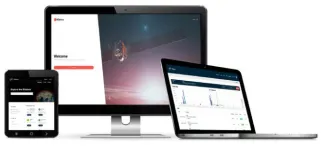
Taking eo business to the next level
The last decade we’ve witnessed the release of many different EO platforms, all aiming to support end users in their increasing data needs. In the beginning, these platforms mainly focused on data access. Nowadays, most of them also offer the computing power required to do large-scale data processing allowing them to serve many more users with different skill levels and removing some of the IT-related burdens that often appeared when integrating a service onto a platform. However, the variety of tools and the lack of interoperability between these platforms pose a challenge and a risk of lock-in to the user.
With the Terrascope EOplaza, we want to take it one step further. We want to serve both end users and service providers and bring them together to create on a unique and vivid community. We want to offer a one-stop-shop to share and access EO services and datasets. We want to host a centralized and innovative platform where users can create, share, and monetize their own services. Increasing a service's visibility by e.g., publishing it on the Terrascope EOplaza enables users to easily share their work among peers and other communities and deliver added value to the right stakeholders.
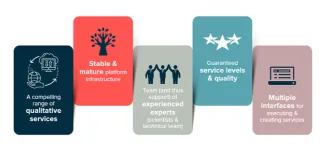
from prototype level to fully operational services
The Terrascope EOplaza is built on top of the existing Terrascope Platform. Terrascope provides a carefully curated set of standardized orchestrators, OpenEO and ASB, together with a large processing environment that allows users to easily create a service on top of the available datasets. OpenEO and ASB are both aimed at creating re-usable code that can run on different platforms, not binding the user to a single platform. Moreover, different types of interfaces (Graphical User Interfaces, Application Programming Interfaces, Jupyter Notebooks) are offered to expand possibilities and serve users with varying technical skills to either create or consume services.
Each service is labelled with a service maturity level, giving the user a clear indication on what to expect in terms of quality and performance. This encourages providers to onboard their services from a prototype level to gather feedback from the community to a fully validated and operational level, where they can monetize on them.
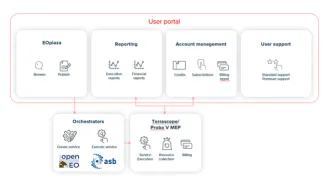
Reducing administrative and financial issues
Additional to a public service offering, the EOplaza includes built-in functionalities for billing and reporting. With this capability, service providers do not have to deal with financial and legal aspects of a service offering and can instead focus on their service and enjoy the platform's benefits.
Users that already have a Terrascope account will be able to access the Terrascope EOplaza via their current account. New users can easily create an account in just a few clicks. Every registered user will receive 1000 free credits to get familiarized with the EOplaza, its services and their execution. These credits are replenished every month. In addition, users can purchase either a one-off credit top-up or a monthly subscription to replenish their credits and order additional services. Click here to discover which pricing offers fits your needs.
The EOplaza business framework lowers the cost for service providers to offer their services, while reaching more than 4000 active users that are already part of our Terrascope community. Service providers can also easily call in the Terrascope data science and engineering team to implement their service(s) onto the EOplaza.
Many EO services are initiated in research projects. Most of the time, these services end up being obsolete before they can be discovered by end users, because the projects rarely have the budget to operationalize these services. By not only removing the operational, administrative and financial fuss, these services can be offered via the Terrascope EOplaza, thereby increasing their life span and providing potential exploitation outside of the initial research project.




